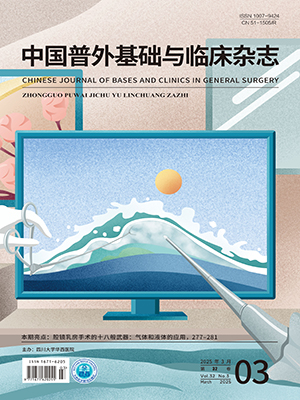| 1. |
孙可欣, 郑荣寿, 张思维, 等. 2015 年中国分地区恶性肿瘤发病和死亡分析. 中国肿瘤, 2019, 28(1): 1-11.
|
| 2. |
Kulik L, Heimbach JK, Zaiem F, et al. Therapies for patients with hepatocellular carcinoma awaiting liver transplantation: a systematic review and meta-analysis. Hepatology, 2018, 67(1): 381-400.
|
| 3. |
Tsoulfas G. Current perspective in the management of hepatocellular carcinoma: time to get personal! J Invest Surg, 2020, [Online ahead of print].
|
| 4. |
中华人民共和国国家卫生健康委员会医政医管局. 原发性肝癌诊疗规范 (2017 年版). 中国实用外科杂志, 2017, 37(7): 705-720.
|
| 5. |
Zhang W, Wang X, Jiang R, et al. Effect of tumor size on cancer-specific survival in small hepatocellular carcinoma. Mayo Clin Proc, 2015, 90(9): 1187-1195.
|
| 6. |
盛若凡, 金开璞, 陈旭晓, 等. 巴塞罗那 0 期肝细胞癌患者术后肝内复发危险因素. 中华肝胆外科杂志, 2018, 24(12): 793-796.
|
| 7. |
赵晖, 陈骏, 严笑鹏, 等. 肝细胞癌患者微血管侵犯的组织学风险分级与预后的关系. 中华肝胆外科杂志, 2019, 25(6): 401-405.
|
| 8. |
施显茂, 陈洁, 麦荣云, 等. 乙肝相关性巴塞罗那 A 期肝细胞癌术后早期复发转移的危险因素分析. 中华普通外科杂志, 2019, 34(2): 97-99.
|
| 9. |
吕少诚, 潘冰, 李立新, 等. 原发性肝癌肝移植患者预后评价及相关影响因素分析. 中华肝胆外科杂志, 2019, 25(7): 493-496.
|
| 10. |
Sumie S, Nakashima O, Okuda K, et al. The significance of classifying microvascular invasion in patients with hepatocellular carcinoma. Ann Surg Oncol, 2014, 21(3): 1002-1009.
|
| 11. |
Erstad DJ, Tanabe KK. Prognostic and therapeutic implications of microvascular invasion in hepatocellular carcinoma. Ann Surg Oncol, 2019, 26(5): 1474-1493.
|
| 12. |
Chan SC, Fan ST, Chok KS, et al. Survival advantage of primary liver transplantation for hepatocellular carcinoma within theup-to-7 criteria with microvascular invasion. Hepatol Int, 2011, 6(3): 646-656.
|
| 13. |
中国抗癌协会肝癌专业委员会, 中华医学会肝病学分会肝癌学组, 中国抗癌协会病理专业委员会, 等. 原发性肝癌规范化病理诊断指南 (2015 年版). 中华肝胆外科杂志, 2015, 21(3): 145-151.
|
| 14. |
Shindoh J, Kobayashi Y, Kawamura Y, et al. Microvascular invasion and a size cutoff value of 2 cm predict long-term oncological outcome in multiple hepatocellular carcinoma: reappraisal of the American Joint Committee on cancer staging system and validation using the Surveillance, Epidemiology, and End-Results Database. Liver Cancer, 2020, 9(2): 156-166.
|
| 15. |
Kobayashi Y, Kiya Y, Sugawara T, et al. Expanded Makuuchi’s criteria using estimated indocyanine green clearance rate of future liver remnant as a safety limit for maximum extent of liver resection. HPB (Oxford), 2019, 21(8): 990-997.
|
| 16. |
European Association for the Study of the Liver. Electronic address: easloffice@easloffice. eu. EASL Clinical Practice Guidelines: management of hepatocellular carcinoma. J Hepatol, 2018, 69(1): 182-236.
|
| 17. |
Shindoh J, Makuuchi M, Matsuyama Y, et al. Complete removal of the tumor-bearing portal territory decreases local tumor recurrence and improves disease-specific survival of patients with hepatocellular carcinoma. J Hepatol, 2016, 64(3): 594-600.
|
| 18. |
Famularo S, Piardi T, Molfino S, et al. Factors affecting local and intra hepatic distant recurrence after surgery for HCC: an alternative perspective on microvascular invasion and satellitosis–a Western European multicentre study. J Gastrointest Surg, 2020, [Online ahead of print].
|
| 19. |
Famularo S, Di Sandro S, Giani A, et al. Recurrence patterns after anatomic or parenchyma-sparing liver resection for hepatocarcinoma in a western population of cirrhotic patients. Ann Surg Oncol, 2018, 25(13): 3974-3981.
|
| 20. |
Li J, Han X, Yu X, et al. Clinical applications of liquid biopsy as prognostic and predictive biomarkers in hepatocellular carcinoma: circulating tumor cells and circulating tumor DNA. J Exp Clin Cancer Res, 2018, 37(1): 213.
|
| 21. |
Sun YF, Guo W, Xu Y, et al. Circulating tumor cells from different vascular sites exhibit spatial heterogeneity in epithelial and mesenchymal composition and distinct clinical significance in hepatocellular carcinoma. Clin Cancer Res, 2018, 24(3): 547-559.
|
| 22. |
Chen SL, Xiao H, Xie ZL, et al. The presence of microvascular invasion guides treatment strategy in recurrent HBV-related HCC. Eur Radiol, 2020, 30(6): 3473-3485.
|
| 23. |
Vivarelli M, Cucchetti A, La Barba G, et al. Liver transplantation for hepatocellular carcinoma under calcineurin inhibitors: reassessment of risk factors for tumor recurrence. Ann Surg, 2008, 248(5): 857-862.
|
| 24. |
Cholongitas E, Mamou C, Rodríguez-Castro KI, et al. Mammalian target of rapamycin inhibitors are associated with lower rates of hepatocellular carcinoma recurrence after liver transplantation: a systematic review. Transpl Int, 2014, 27(10): 1039-1049.
|
| 25. |
Chen W, Ma T, Zhang J, et al. A systematic review and meta-analysis of adjuvant transarterial chemoembolization after curative resection for patients with hepatocellular carcinoma. HPB (Oxford), 2020, 22(6): 795-808.
|
| 26. |
邱慧兵, 易铁男. FOLFOX7 新辅助化疗方案联合肝移植术治疗进展期肝癌的疗效观察. 河北医药, 2017, 39(7): 1020-1022.
|
| 27. |
周俭, 肖永胜, 樊嘉. 分子靶向药物对肝癌复发转移防治作用. 中国实用外科杂志, 2012, 32(10): 860-864.
|
| 28. |
高婧雅, 郭庆军, 谢炎, 等. 雷帕霉素联合索拉非尼在超米兰标准肝移植肝细胞癌复发患者中的疗效观察. 中国普外基础与临床杂志, 2018, 25(9): 1039-1043.
|
| 29. |
毛廷辉, 吴刚. 复发性肝癌靶向治疗及免疫治疗. 中国实用外科杂志, 2019, 39(10): 1048-1051.
|
| 30. |
Tang J, Sui CJ, Wang DF, et al. Targeted sequencing reveals the mutational landscape responsible for sorafenib therapy in advanced hepatocellular carcinoma. Theranostics, 2020, 10(12): 5384-5397.
|




